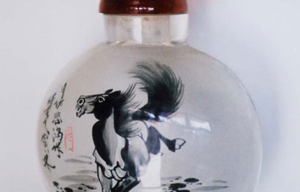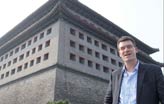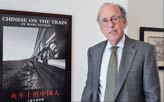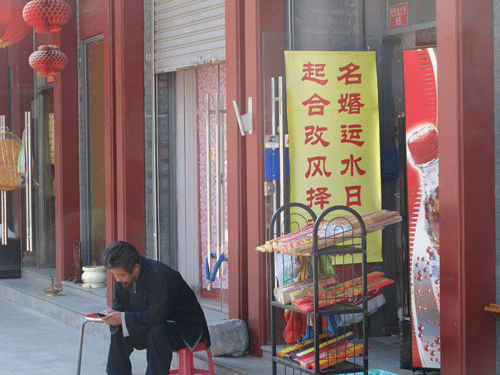Society
What the stars foretell
Updated: 2011-09-22 07:58
By Wang Kaihao (China Daily)
|
A storekeeper waits for customers in front of his fortune-telling business near Yonghegong Lama Temple in Beijing. Photos by Wang Kaihao / China Daily |
More Chinese are turning to fortune-telling and geomancy as set out in the classic texts. Wang Kaihao reports.
The west gate of Yonghegong Lama Temple in downtown Beijing is always crowded with visitors from home and abroad, the air filled with the fragrance of incense and the chants of Tibetan Buddhists. What is less conspicuous, though, are the 30-odd shops on the main road offering to tell your fortune, with even more crammed in the nearby alleys.
Although fortune-telling is not illegal in China, the government discourages its practice. Even so, scenes like the one at Yonghegong are playing out in many cities across the nation.
Hong Xinyu, who works with the Industrial and Commercial Bank of China in Wuhu, Anhui province, is one of the believers.
"A fortune-teller told us years ago that the future work of my family members would be closely related to money. At that time, my mom was working for the railways and I was just a student," Hong says.
"Now, my mom works at China Mobile and does deal with money everyday, and I am with a bank."
Hong often goes to draw divination sticks in a local temple and is struck by the accuracy of the predictions.
"One stick said I always dream of becoming a celebrity without hard work and that will never come true," Hong sighs. "That's so true."
Most Chinese fortune-telling methods are based on the Taoist I Ching, or Book of Changes, and its principles of ba gua, or eight diagrams.
The book is generally believed to have been written by Zhou Wen Wang (1152-1056 BC), founder of the Zhou Dynasty, and later completed by Confucius (551-479 BC).
Gong Yulin, a Beijing-based fortune-teller, claims to have his own "consultancy" although no such business can be officially registered under current regulations.
Gong, who looks much older than his 28 years, says he has studied the I Ching since he was 13. He even became apprenticed to an I Ching scholar two years later, after completing high school.
"I liked reading in my childhood. One of my teachers in junior high school told us I Ching is the basis of ancient Chinese classics, so I decide to read it, and was instantly hooked."
Most of his customers are businessmen who want to guard against potential losses, and are willing to pay as much as 100,000 yuan ($15,460) for his predictions.
"These companies usually want to know how much money they can earn in the future. They sometimes ask what will be the exact turnover the next day."
Gong says at least one businessman stops by everyday to ask about the future of his company. Countless others approach him with questions about their love lives, jobs and health. He charges 8,000 yuan ($1,237) for a detailed yearly forecast.
"I can tell how their life will be based on their name, date of birth and analysis of ba gua," Gong claims.
"When you are concerned about your destiny, you will also change your everyday habits and attitudes."
Not all people take such predictions seriously, though.
Wu Ran, who works for Sinopec Petroleum Group, approached a fortune-teller to ask about his career prospects, when he traveled to Hong Kong in August.
"The fortune-teller said I will have a new position in the company by the end of this year, but I will just have to wait to find out if that's true."
He says it was his first visit to a fortune-teller and he was driven by curiosity.
"I don't think everything is predestined, and believe the future lies in my own hands."
Wu also feels some so-called "fortune-tellers" are actually swindlers.
Gong admits the business is not well-regulated.
"But you can't fault fortune-telling itself. Some people use it for deception and ruin its reputation."
Increasing interest in fortune-telling is matched by the growing popularity of feng shui, or geomancy, especially when it comes to building plans.
Some of Gong's customers are realtors looking for advice on house design.
Several Chinese universities now run courses on feng shui for architecture majors. I Ching has become an integral part of guoxue, or the study of ancient Chinese civilization.
Wu Xiaoxin, who runs a costume business in Wuhan, capital of Hubei province, says she took guoxue courses at Renmin University in Beijing last year and now has a better idea of feng shui and I Ching.
"Feng shui tells you some house designs can bring you bad luck, but it's not always that metaphysical," Wu says. "For example, it's considered a bad omen to have a mirror facing the entrance, but there's a simple explanation for this. One may just be startled to enter a room and find oneself staring into a mirror."
She says she was drawn to study the I Ching to find inner peace and mental strength.
"Even if our lives are predestined, we can still have a positive attitude to deal with all that life throws at us."
Qi Si, a philosopher professor at Jilin University in Changchun, capital of Jilin province, who has studied the I Ching for more than 20 years, says: "Many people feel discouraged by the stresses of modern life and become nervous about the future. That's why they turn to fortune-telling. It's understandable."
But, Qi says, fortune-telling based on I Ching also reflects the collective wisdom of Chinese civilization.
"When people link Chinese fortune-telling solely with superstition, it reflects a lack of confidence in our own culture," Qi says. "Western astrology is popular among Chinese youngsters, so why not tolerate Chinese fortune-telling?
"Despite disagreements between Christians and atheists, the Bible survives. It should be the same with the I Ching, from which many guoxue classics are derived."

E-paper

The snuff of dreams
Chinese collectors have discovered the value of beautiful bottles
Perils in relying on building boom
Fast forward to digital age
Bonds that tie China. UK
Specials

Let them eat cake
Cambridge University graduate develops thriving business selling cupcakes

A case is laid to rest
In 1937, a young woman'S body was found in beijing. paul french went searching for her killer

Banking on change
Leading economist says china must transform its growth model soon

